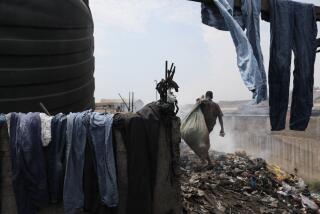Fashion Firms Told to Police Contractors : Labor: “Hot goods” statute is being used to make big apparel makers stop working with companies that violate laws.
More than one-quarter of the manufacturers in Southern California’s apparel industry--including some of the area’s biggest names in fashion--have been told by the federal government to stop doing business with contractors violating labor laws, newly released documents show.
U.S. Labor Department officials issued the directives to 157 Southland apparel manufacturers in a program launched in 1991 to attack minimum wage, overtime pay and child labor law violations in the abuse-ridden industry.
The campaign, waged under a 1938 law known as the “hot goods” statute, is intended to crack down on the small garment sewing and cutting shops where most of the abuses are believed to occur by putting pressure on their customers--the big-name apparel manufacturers. The effort augments other federal and state enforcement and inspection programs that aim directly at the contractors.
The Times obtained documents detailing the crackdown through the federal Freedom of Information Act.
Rolene Otero, enforcement chief for the U.S. Labor Department in Los Angeles, said the hot-goods investigations are continuing. She predicted that many more manufacturers will eventually face enforcement directives.
“We’ve been going slow because there are so many problems in the industry, but we’re going to speed up,” Otero said. “Probably 90% of the manufacturers are doing business with contractors who are violating laws, and, consequently, they are violating the law themselves by shipping hot goods.”
She conceded that only somewhat more than a third of the manufacturers are “serious violators.”
Geoff Cline, general counsel for Ventura-based Patagonia Inc., said his firm was contacted by the Labor Department after one of its 40 U.S. contractors was found to be violating the overtime pay law.
“I’m aware there are widespread abuses in the garment industry, but that wasn’t the case with us,” Cline said. “We are very good corporate citizens. We met within 24 hours with the Department of Labor and found out what the situation was. We had no knowledge of what was going on there, and, in fact, the contractor herself wasn’t aware she was in violation.”
The matter was settled, Cline said, when the contractor paid a fine of roughly $6,000.
Bernard Lax, president of the Coalition of Apparel Industries in California and head of a firm contacted by the Labor Department, insisted that the “really serious violations” involve “a very small number” of manufacturers.
In the case of his firm, knitwear maker Louie Bernard Inc., Lax said the Labor Department questioned the actions of a subcontractor that had no direct dealings with Louie Bernard.
Such situations, he said, point out the difficulty that the hot-goods campaign presents: “They want every manufacturer to be a policeman over their contractors,” Lax said, even when sometimes “you might work with a guy a month and then never again.”
But Steve Nutter, Western regional director of the International Ladies’ Garment Workers’ Union, said manufacturers routinely send quality-control inspectors to their contractors’ shops who are well aware of the abuses.
“The violations go on with a wink and a nod,” Nutter said. “It’s a matter of hear no evil, speak no evil. . . . Nobody cares. These are Third World people who don’t vote and who have no power.”
Of the 157 manufacturers contacted by the Labor Department, Otero said 17 have consented in writing to comply with the law; the others, including Louie Bernard, have agreed informally.
In the most celebrated agreement to come out of the hot-goods investigation, jeans maker Guess? Inc. agreed last summer to police its estimated 100 sewing contractors to make sure they observe federal labor law.
The government signed a similar pact in April with Z Cavaricci Inc., which makes sportswear for department stores and specialty shops.
Nonetheless, Otero said the government is investigating six of the 157 companies for possible violations that came after their pledges. She said she expects to take at least two of the firms to court this summer.
Other manufacturers among the 157 contacted by labor officials are Cherokee Inc., Carole Little, Enchante, Chorus Line, E.Z. Sportswear, Jonathan Martin, Rampage and Ocean Pacific.
More to Read
Sign up for Essential California
The most important California stories and recommendations in your inbox every morning.
You may occasionally receive promotional content from the Los Angeles Times.










